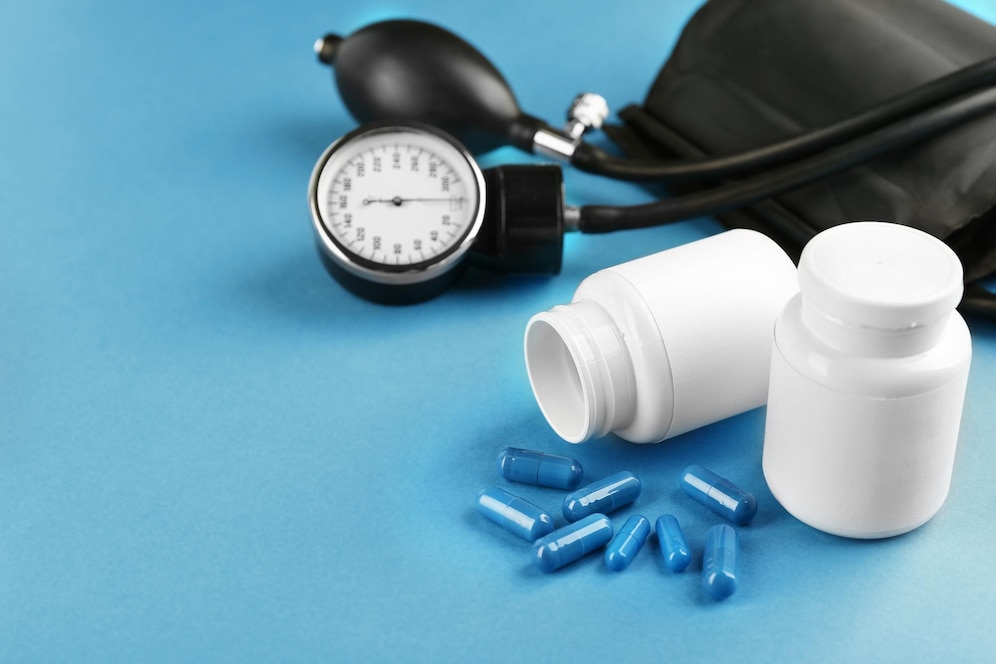Last updated on May 10th, 2025 at 12:21 pm
Contents
Treating high blood pressure
If your blood pressure is between 130/80 and 140/90 mmHg (millimetres of mercury), your doctor will prescribe high blood pressure medications to help lower your pressure. These medications will also reduce the risk of heart attack and stroke.
Besides taking blood pressure tablets, you must also follow a healthy diet and lifestyle to maintain your blood pressure and overall health and well-being.
Let us understand the various high blood pressure medications and how they work.
7 High blood pressure facts you should be aware about | Hypertension
High blood pressure medication options
Blood pressure medications
Doctors may prescribe one or more high blood pressure tablets to lower your blood pressure. These include:
Diuretics
Diuretics are a standard treatment for high blood pressure. They are also called water pills. They help remove sodium or salt and water from your body. These pills work quickly to reduce fluid retention. Their effect lasts about six hours. After you start taking these pills, you may need to urinate more often.
These pills help your kidney release salt through urine.
The sodium further helps remove excess water from your blood and thus reduces the fluid from your arteries and veins.
These pills also treat swelling, heart failure, liver failure and kidney stones.
Diuretics come in three types
- Thiazide
- Loop
- Potassium-sparing
All three types work on different parts of the kidney. Some blood pressure tablets are a combination of two types of diuretics. Your doctor may also prescribe pills that combine diuretics with other blood pressure medications. The ideal diuretic for you depends upon your condition.
If a diuretic doesn’t help lower your blood pressure, your doctor will prescribe other high-blood pressure medications.
Beta-blockers
Your doctor will prescribe beta blockers if other medications, such as diuretics, do not help lower your blood pressure. Beta-blockers work within 30 minutes to four hours of taking the first dose. Your doctor will prescribe these blood pressure tablets depending on your health.
These medications help in the following ways:
- They cause the heart to beat slowly and with less force. This reduces your blood pressure.
- They widen your arteries, which helps improve blood flow.
- Beta-blockers also help treat chest pain, heart failure and heart attacks.
Alpha-blockers
Alpha-blockers are also high-blood-pressure medications that keep the arteries open and relaxed. This improves blood flow and helps lower your blood pressure gradually.
These drugs are either short-acting or long-acting. Short-acting alpha-blockers work fast, but their effects last a shorter while. Long-acting alpha-blockers take longer to work, but their effect lasts longer.
To control your blood pressure, your doctor may prescribe these medications along with diuretics.
As these medications lower your blood pressure, your doctor will advise you to take these at bedtime. You may feel lightheaded when rising from a sitting or lying position.
Angiotensin-converting enzyme (ACE) inhibitors
ACE inhibitors relax the arteries and lower blood pressure. Your doctor may prescribe an ACE inhibitor and a diuretic or a calcium channel blocker to lower your blood pressure.
These drugs also help treat heart attacks, heart disease and heart failure.
ACE inhibitors take around 30 minutes to four hours to show effect after the first dose and 2 to 4 weeks for better effect.
Calcium channel blockers
These high blood pressure medications prevent calcium from entering the heart and arteries. This helps relax and open up your arteries.
Calcium channel blockers also slow the heart rate and lower blood pressure.
Calcium channel blockers are short-acting or long-acting. Short-acting channel blockers work faster, but their effect lasts for a short time. Long-acting channel blockers work slowly, but their effect lasts longer.
Your doctor will prescribe the ideal calcium channel blockers depending on your condition.
Angiotensin II Receptor Blockers (ARBs)
ARBs are high blood pressure medications that relax the arteries and lower blood pressure. They are also used to treat heart failure and kidney disease.
Your doctor will prescribe an ARB if your blood pressure does not come under control with ACE inhibitors. You may have to take a single dose of this medication in the morning or as per the doctor’s instructions.
ARBs start working within 1 to 4 hours of the first dose and take approximately 2 to 4 weeks for better effect.
Summing up
While high blood pressure medications are crucial in lowering your blood pressure, a balanced diet and healthy lifestyle also help maintain the pressure. Apart from relaxing techniques and yoga, you can also develop a hobby to manage stress and anxiety. Check your blood pressure regularly, and do not discontinue your medicines without consulting your doctor.
You can now buy all your high blood pressure medications on Medkart, your trusted online pharmacy. To place your orders, download our app today!
FAQs related to Blood Pressure
1. What are the side effects of blood pressure medications?
The common side effects of high blood pressure medications are:
- Diuretics: Low potassium levels and weakness
- Beta-blockers: Dizziness, exhaustion and low heart rate
- Ace-inhibitors: Diarrhoea, dry cough, headache and high potassium levels
- Calcium channel blockers: Constipation, dizziness and swelling of ankles
- Angiotensin receptor blockers: Diarrhoea, dizziness, exhaustion and congestion
2. Which medications cause high blood pressure?
Medications for other health conditions often cause high blood pressure. These are:
- Birth control pills
- Migraine medications
- Amphetamines
Over-the-counter medications prescribed for allergies and cold
3. When should I consult my doctor about high blood pressure?
Regular meetings with your doctor are crucial if you have high blood pressure. You can consult them if your blood pressure levels are not reducing or if you have side effects from high blood pressure medications. They will change the dosage or prescribe other medication.
